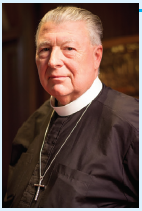What is prayer? How does it influence my daily life and yours? Looking at my prayer life made me ask, “What is the action of prayer?” There had to be a place to start searching for the answer to that question. Then it hit me: just go to the holy scriptures.
We all know that scripture has the answer to all questions about life. I started to pray and read the Word of God. Recalling the words of the Rt. Rev. Hugh Montefiore, it hit me like a brick. “On our knees in prayer … on our feet in action.” Montefiore’s words give clarity to the meaning of holiness and divine perspective. His words make it seem so simple.
Or is it?
 More questions came to mind. What is prayer? What is action? How do I achieve prayer and action in my life? The first place I searched was the Old Testament book of Ezra. Ezra was a priest, a scribe, and a great leader who recorded events from about 538 B.C. through 450 B.C. His name means “help,” and that is what he did his whole life. He dedicated his life to serving God and the exiled Jews who had returned from captivity.
More questions came to mind. What is prayer? What is action? How do I achieve prayer and action in my life? The first place I searched was the Old Testament book of Ezra. Ezra was a priest, a scribe, and a great leader who recorded events from about 538 B.C. through 450 B.C. His name means “help,” and that is what he did his whole life. He dedicated his life to serving God and the exiled Jews who had returned from captivity.
Ezra’s prayer actions answered the questions Why do we pray? and What should we expect from prayer? “So we fasted and petitioned our God about this, and He answered our prayer” (Ezra 8:23).
God answers prayer. But are we listening for His answer? When we communicate with God through prayer, we need to be still and listen for his answer. Prayer is serious and a deliberate action. It’s our act of obedience to God. We’ve prayed, listened, and heard an answer from God. Now what?
Continue to pray. Pray even if others might notice. That’s scary. Someone might notice that I am praying! Pray like Daniel, who continued to pray even when it meant he might be put to death. Daniel said the Jews who were captive prayed, and they heard from God. God told them He was in control of heaven and earth. He was directing nature, the destiny of nations, and the future of His people.
God spoke to Daniel in a vision. That was Daniel’s “Now what?” moment. So what did he do then? What should we do when we have that “Now what?” moment?
Daniel praised God. “To you, O God of my ancestors, I give thanks and praise, for you have given me wisdom and power, and have now revealed to me what we asked of you, for you have revealed to us what the king ordered” (Daniel 2:23).
Daniel was driven to pray. Could I be driven to pray? Are you driven to pray? Is prayer your rule of life? Could it be mine?
Prayer doesn’t guarantee me a life without problems. And it won’t do that for you. Life still has challenges, road bumps, potholes, and distractions. It leaves me in a physical, mental, and spiritual mess.
We try to turn to prayer as an escape from our troubles (I know I do). But God’s not just in my life when I hit a pothole. He’s present every moment of my life. We all need to turn to God in moment-by-moment prayer. Pray not as an escape but as a discipline to remind you of God’s presence in every moment of every day.
In the seventh century, Sir Isaac of Syria gave advice on the relation between prayer and our daily lives. He said, “Do not reduce your prayer to words; make the totality of your life a prayer to God.” Live every moment of every day in the presence of God in prayer.
When I was ordained in God’s church, my discipline of prayer became a desperate desire for moment-by-moment communication with God. Prayer gives me strength to sustain the demands of life.
And God can give us all the strength to rise from our prayer onto our feet and fulfill the ministry He has called each of us to do. When we rise to that calling, we are transformed by the power of prayer. We are transformed into more than just a person who only knelt to pray. At that point of transformation, like Daniel, we are able to understand.
God is in control of everything on heaven and earth. Surrender to God’s control, and things really start to happen. When we surrender and get up off our knees, God can put us in circumstances we do not control. Off my knees and on my feet in action lets me get a peek of who God wants me to be.
At that moment of transformation, your life in Christ is changed. You become more deliberate and daring in a creative sense of the present while remembering the past. Transformation gave me the hopeful vision of a future grounded in my conviction of God’s grace and salvation.
In that transformation, we then take hold of who we are and not what we do, and we live it in love. John reminds us of this in his Gospel writing. Simon Peter spoke to Jesus:
“Lord, are you going to wash my feet?”
Jesus answered, “You do not know now what I am doing, but later you will understand.”
Peter said to him, “You will never wash my feet.”
Jesus answered, “Unless I wash you, you have no share with me” (John 13:6b-8).
Jesus was using his time with Simon Peter as a teaching moment. And today He is still trying to teach you and me the same lesson. To be a leader, you must be a servant.
We serve others in love because we are the eyes, hands, and feet of Christ in the community. We are more and more deeply involved in the life of the community. Now we are able to interpret the needs of the community and bring those needs to the church.
A deacon’s ministry is being present with people who struggle and are broken. While we minister to those in need, we don’t have all the answers. What we must offer is consistent encouragement, compassion, and prayer. By the power of the Holy Spirit, we are to live and work for God’s praise and to his glory while we bring the needs of the world to the body of the Church.
Is our prayer life changing us? Are we being stretched? A regular prayer life takes us out of our comfort zone. We will be challenged to go places we would not normally go. And when we go to those places, we act on our deliberate and daring need to be in God’s presence through prayer. As our communication with God increases, we are increasing our ability to communicate with others.
I am again reminded of the words of the Rt. Rev. Montefiore, an Anglican theologian of the Church of England, who died in 2005. These are his words: “Holiness means living within divine perspective. Divine perspective is achieved through our attention to praise God, on our knees in prayer. And from our obedience to God, on our feet in action.”
Rev. John E. Clark serves as Deacon at St. Gabriel’s in Titusville. John is Director of the No One Hungry ministry and is a member of the International Order of St. Luke the Physician, where he holds the office Florida State Representative and was recently elected to the OSL North American Board of Directors.

